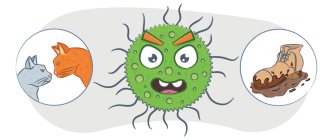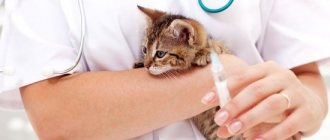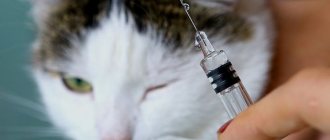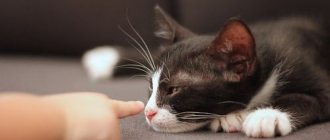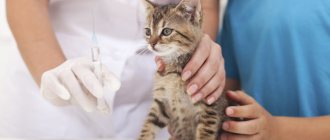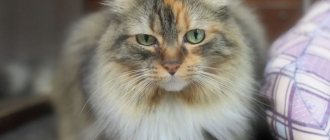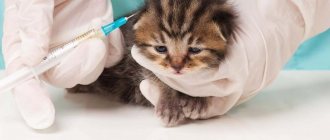Vaccination of cats and kittens is an integral part of pet care. All of them have diseases that are not at all dangerous to humans, but carry a mortal danger to animals.
The owner can bring pathogenic viruses into the house on shoes and clothes, thereby infecting the pet. That is why it is important to prevent the disease in time.
What vaccinations do kittens get?
Most cat owners are concerned about the question: what vaccinations should a kitten receive and whether they are mandatory.
All cat infections are extremely dangerous and are difficult for animals to tolerate. In 70% of cases, death occurs, so the baby needs to be vaccinated. Moreover, no one knows what the fate of the animal will be. Perhaps one day a pet will escape outside and come into contact with a sick representative of the fauna world.
According to the vaccination schedule, small representatives of the cat family are vaccinated against diseases that pose a serious threat to life and health.
- Leptospirosis. A dangerous infectious disease that threatens a rat-catcher or mouse-catcher, since rodents are the carriers of this infection. Owners whose pets like to walk on their own should pay attention to this disease. Basically, cats carry the infection latently (hidden), so veterinarians detect the disease at the last stage. The main signs of infection are internal and external hemorrhages (nasal/eye), fever.
- Important: Leptospirosis is transmitted to people.
- Herpesvirosis. A viral infection transmitted by airborne droplets. The disease is also popularly called rhinotracheitis. Mostly, kittens up to 7 months old suffer from herpesvirus. The disease manifests itself in the form of conjunctivitis and catarrhal lesions of the upper respiratory tract.
- Calicivirus. A disease similar to the previous one that affects young cats. It affects the respiratory organs. Symptoms include ulcers in the mouth, increased mucus in the nose, and lacrimation.
- Panleukopenia (plague). Kittens are more likely to suffer from this disease than cats. The infection is transmitted through direct contact with infected excrement or the owner's outdoor shoes that have been in plague-infected feces/soil.
Additionally, cats are vaccinated against chlamydia and leukemia if the animal is expected to participate in exhibitions, spend some time outdoors, or have contact with its feline companions.
What does vaccination help with?
Modern veterinary science, thanks to the creation of preventive vaccines, is able to prevent the development of many common cat diseases, which can often lead to very sad consequences. Here are the vaccinations your cat needs:
- Vaccination against rhinotracheitis (feline herpes);
- Vaccination against feline panleukopenia (distemper in cats);
- Administration of the chlamydia vaccine;
- Microsporia and trichophytosis (vaccination of cats against lichen);
- Calcivirosis (“cat flu”).
Dogs that are given certain medications, such as cyclophosphamide, may also suffer from cystitis.
Does a cat need a rabies vaccination?
Vaccination of cats against rabies is a separate topic, which is why it was not mentioned above. This disease affects not only animals, but also humans. Are cats vaccinated against rabies? Not only do they do it, in some cases this procedure is even regulated by law.
It turns out that vaccinating a domestic cat against rabies is a guarantee of the safety of not only the pet itself, but also its owners. This means that it is necessary and obligatory. Don't neglect it. It is very easy to catch a dangerous disease; it is easily transmitted to humans. If he is bitten by a cat, a rabies vaccination can save the situation.
What to do if the vaccination schedule is broken
It happens that the vaccination schedule is greatly disrupted or completely unknown. This happens if a kitten was picked up on the street, but it looks like a home, which can be judged by the presence of a collar, or if the owners simply missed the moment of re-vaccination for their pet. Here you should consult your veterinarian. The doctor will tell you how best to proceed in each specific case. Sometimes a complete repeat of the kitten vaccination schedule is required, and in some situations the doctor can make an individual decision after examining the animal.
Vaccination for a cat: rules and recommendations
After deworming, the cat is not vaccinated immediately. Before administering the vaccine, it is necessary to examine the animal. His general condition, temperature, tests are important components of the conclusion about the possibility of vaccination. If everything is fine with the cat, the main procedure of administering the vaccine begins. It takes no more than a minute, sometimes even seconds. Often the vaccination will consist of not one, but two injections. As mentioned above, the second injection is the introduction of a rabies preventative.
There are no trifles here: the correct choice of drug, injection skills, consultation on possible complications - these are the main arguments in favor of the fact that vaccination should be done by veterinarians.
Vaccine selection
The correct choice of medication for vaccination is one of the main components of “immune” success. Professionals are guided by the following rules:
- young cats are imported products with a mild effect; adult cats can be vaccinated with a variety of drugs;
- the instructions are required to be studied;
- Compliance with expiration dates is an important condition for ensuring the effectiveness of a medicinal product.
Information about vaccination must be recorded in the veterinary passport. Usually a special sticker is glued into it, which is included with the administered drug.
Self-vaccination
Some people vaccinate their pets themselves. According to veterinarians, this is an additional health risk. Not every cat owner is able to give the injection correctly, much less has sufficient qualifications to select the drug and its dosage. The result is a visit to the veterinary clinic, but not for vaccination, but to eliminate the consequences and complications.
Types of cat vaccines
The following vaccines are most often used to vaccinate kittens:
- Nobivac Forcat. A multicomponent vaccine that stimulates immunity in kittens to calicivirus, panleukopenia, rhinotoacheitis and chlamydia;
- Nobivac Tricat. Triple action vaccine against calicivirus infection, rhinotracheitis and panleukopenia. The first vaccination for kittens is given at the age of 8 weeks. Revaccination (repeat vaccination) should be carried out annually;
- Nobivac Tricat. It also protects the little furry from the four main diseases listed. The first vaccination for a kitten can be given at the age of 12 weeks;
- Nobivac Rabies. This type of kitten vaccine only protects against rabies. The animal develops stable immunity 21 days after vaccination. Revaccination should be carried out annually. It is acceptable to mix Nobivak Rabies with other types of Nobivak vaccines;
- FORT DODGE FEL-O-VAX IV. This is a polyvalent vaccine - against several infections. Is inactivated. Protects the cat immediately from rhinotracheitis, panleukopenia, calicivirus and chlamydia. Approved for use in kittens over 8 weeks of age. Revaccination is carried out once a year;
- Purevax RCP. A multicomponent vaccine, which included strains of rhinotracheitis, panleukopenia and calicivirosis.
- Purevax RCPCh. Contains weakened strains of the viruses listed above. The vaccine is given at the age of 8 weeks. A month later they repeat. In the future, revaccination is indicated once a year.
- Leucorifelin. Protects the animal from viral viruses and panleukopenia. It is prohibited to administer Leucorifelin with other vaccines;
- Quadricate. Vaccination for kittens against panleukopenia, rabies and calicivirus. The kitten's immunity is formed in 2-3 weeks. Repeated vaccination is carried out every year;
- Rabizin. This drug is only for rabies. Unlike other types of vaccines, Rabizin can be administered even to pregnant cats;
- Leukocel 2. Vaccine against leukemia in cats. The vaccine is given twice. Then revaccination is carried out once a year. Kittens are vaccinated at the age of 9 weeks;
- Phelocel CVR. The drug stimulates the production of immunity against rhinotracheitis, panleukopenia and calicivirus. The vaccine looks like a porous mass of pale yellow color. Before use, it is diluted with a special solvent;
- Microderm. The vaccine allows you to protect the animal from dermatophytosis (lichen, etc.).
Important: it is worth remembering that young cats under 3 years of age, as well as old and weakened animals, are always at risk.
How much does a cat's vaccination cost?
The cost of cat vaccination is not prohibitively high and is affordable to everyone. Compared to the problems that can be caused without vaccination, the cost is very much worth it. For example, the price of rabies vaccination for a cat is in no way comparable to the financial, moral and time losses that may arise if you refuse to vaccinate your beloved “fluffy” in a timely manner.
Below are the prices for vaccinations at the Univet veterinary clinic.
| VACCINATION OF CATS PRICES | ||
| Vaccine name | Cost, rub) | Note |
| Nobivak Tricat Nobivac Tricat R | 950 1200 | Cat vaccination includes:
|
| Nobivak Forcat Nobivak Forcat + R | 950 1200 | |
| Quadricate | 1200 | |
| Felovax Felovax + Nobivac Rabies | 950 1200 | |
| Purevax FelV (feline viral leukemia) | 1200 | |
| Purevax RCP (calicivirosis, panleukopenia, rhinotracheitis) | 950 | |
| Purevax RCP (calicivirosis, panleukopenia, rhinotracheitis) + Rabizin (or R) | 1200 | |
| Purevax RCPCh (chlamydia, panleukopenia, rhinotracheitis, calicivirosis) | 1450 | |
| Purevax RCPCh (chlamydia, panleukemia, rhinotracheitis, calicivir) + Rabizin (R) | 1450 | |
Possible complications after vaccination in a kitten
Each animal's body reacts differently to the vaccine. Some pets may develop the following side effects:
- apathy and loss of appetite;
- refusal of water and even your favorite food;
- increased drowsiness;
- swelling and induration at the injection site;
- increased body temperature;
- convulsive conditions;
- pleurisy and encephalitis;
- pain at the injection site;
- change in fur color at the injection site and even hair loss;
- some changes in behavior.
Important: in very rare cases, a kitten’s body does not develop immunity to infections and viruses even after vaccination, but this is an individual characteristic of the animal.
As a rule, all non-dangerous side effects go away on their own within 1-4 days after vaccination or require symptomatic treatment. For example, allergic reactions are eliminated with antihistamines. In any case, if side effects occur, you should consult your doctor for advice.
Kitten vaccination rules
In order for the kitten to be vaccinated correctly, you should follow the recommendations.
- Vaccination is not given to kittens younger than 8 weeks.
- Only a completely healthy animal without obvious signs of illness is vaccinated, and it is forbidden to vaccinate a cat if there is a suspicion that it has been in contact with a sick animal. The best solution would be to wait a couple of weeks.
- Before administering the vaccination, the veterinarian must assess the baby’s health status according to several criteria - body temperature, vigor, condition of mucous membranes.
- It is forbidden to vaccinate a kitten for three weeks after surgery and for two to three weeks before surgery.
- You should not send your pet for vaccination after antibiotic treatment. The baby’s body is weakened and even microstrains of the pathogen can provoke serious consequences. After antibiotic therapy, it is better to wait a month.
- Before vaccination, three weeks before the procedure, the animal must be dewormed.
- It is forbidden to vaccinate a cat during the period of teeth change.
- The kitten should be in a relatively calm state during vaccination. Stress and tearing out of your hands are unacceptable.
- Keep an eye on the expiration date of the vaccine if you buy it at a veterinary pharmacy. An expired drug will not benefit your pet.
Preparing for cat vaccination
Cat owners know that they need to do some preliminary preparation before vaccination. First of all, it involves deworming. The main reason for carrying out this procedure is that anthelmintic drugs eliminate the appearance of many unnecessary complications, promote the active production of antibodies, without dispersing immune forces to fight the parasites present in the cat’s body.
It is not necessary to deworm a cat immediately before vaccinations. First, the animal is examined for the presence of external parasites (fleas, ticks, lice), and if they are present, treatment is carried out. A few days after this, deworming can be carried out.
Measures to remove intestinal parasites must be carried out no later than 15-25 days before the vaccination itself.
Interesting: whether or not to feed a cat before vaccination is another point that attracts the attention of pet owners. In fact, it is not that important. Because whether a cat is full or not has no meaning for vaccination.
Where is it better to vaccinate a kitten - at home or in a clinic?
Each cat owner forms the answer to this question for himself due to his financial solvency - some can afford to invite a veterinarian to their home, while others find it easier to take their pet to the clinic. But in any case, the vaccine should only be administered by a qualified doctor.
Advantages of vaccinating a kitten at home:
- you do not transport the animal to the hospital, and as a result, the kitten remains calm at the time of the doctor’s visit;
- the veterinarian has the opportunity to assess the true condition of the pet in its usual environment. When visiting the clinic, the kitten often becomes nervous, anxious, and screams, which interferes with the doctor’s normal work;
- the cat does not have contact with the street and other furry visitors to the veterinary clinic. Due to this, the risk of contracting an infection is significantly reduced;
- you don't waste time going to the hospital.
Advantages of vaccination in the clinic:
- the doctor has at hand all the necessary equipment and tools for a high-quality examination of the animal and vaccination;
- the vaccine is constantly refrigerated before its use, as required by the rules for using the drug. The fact is that the vaccine must be stored and transported only in cold conditions. In case of a home visit, the doctor must bring the drug in a special portable refrigerator;
- if necessary, in a clinic setting, you can immediately carry out any other necessary manipulations, without waiting to visit the hospital. For example, a veterinarian may identify a tick or other problems in a kitten that require immediate attention.
And remember that the veterinarian is the first friend and comrade for your pet after you. He knows exactly how to help a kitten survive the terrible moment of vaccination. For a child, vaccination is stressful, but for an experienced doctor it is a standard procedure, so trust your pet in the hands of a professional and constantly take care of his health. Only in such conditions will the kitten grow up healthy and live a long, happy life, giving you many bright moments!
Important arguments in favor of vaccinating cats
Does my cat need to be vaccinated? Before we begin to understand the intricacies of veterinary medicine and the most important recommendations, let's remember what we know about animal vaccination in general. Vaccination (vaccination) is a whole complex of measures, including the preparatory stage, the procedure for administering the protective drug and the post-vaccination stage.
Interesting: the concepts of “vaccine” and “vaccination” are somewhat different. Not many people know this, and often use both medical terms as synonyms. Differences: a vaccine is a medical product that contains a weakened viral strain; when it is detected, the animal’s body begins to produce protective antibodies itself, forming the necessary immunity. “Vaccination”, also known as “vaccination”, is the procedure or process of administering the vaccine.
Vaccination result:
- After vaccination, a cat acquires enhanced immunity;
- The development of severe, including fatal, cat diseases is excluded;
- There is no need to worry about the possibility of contracting rabies;
- No worries about the cat being outside.
Do cats need vaccinations? A definite answer “yes” can be obtained not only from specialists, but also from most ordinary lovers of furry pets. Vaccination is an almost 100% way to avoid serious cat health problems.
Another argument in favor of vaccinations is that the diseases they are aimed at preventing are difficult to treat or cannot be treated at all. So preventive vaccination is the only option to protect your cat.
Is it possible to refuse vaccination?
Cat vaccination process
Some cat owners deliberately do not vaccinate their pets. Their explanation: animals must develop their own immunity against various infections. The main thing they forget is that a domestic cat is not a wild animal, and its body is more susceptible to the action of bacteria and viruses. Even outdoor cats are better protected than indoor cats.
The statement “a cat never goes outside and can’t catch anything” is also easily broken by criticism. Most causative agents of cat diseases can enter a house or apartment with their owners or simply be blown through an open window by the wind.
Whether to vaccinate or not is a personal decision for each cat owner. But fortunately for pets, those who ignore vaccination are becoming fewer and fewer over time.
